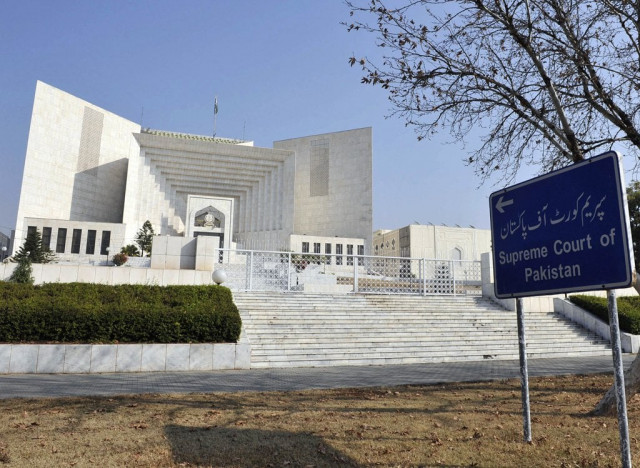SC to review effects of compromise in criminal cases
Five-judge larger bench to deliberate on question today

The Supreme Court of Pakistan. PHOTO: AFP/File
The five-judge larger bench will be headed by CJP Gulzar and comprise Justice Mushir Alam, Justice Umar Ata Bandial, Justice Qazi Faez Isa and Justice Manzoor Ahmad Malik.
The bench will consider today (Wednesday) as to whether a convict will get all benefits and fruits of a lawful acquittal on the basis of a compromise with legal heirs of a victim in criminal matters. The issue has been discussed by five different benches during the last three years.
The controversy arose in March 2017, when Justice Isa in his additional note ruled that when a compromise is accepted, it brings an end to the punishment of the offence, but it does not simultaneously result in setting aside the conviction and acquittal of the convict.
Justice Isa had noted that a compromise with the heirs in criminal matters ‘cannot affect the conviction’.
Later, former chief justice Mian Saqib Nisar had referred the matter to a three-judge special bench to decide whether compounding of an offence under section 345 of the Code of Criminal Procedure (CrPC) amounts to acquittal of the accused person or not.
In June 2018, the three-judge bench – headed by Justice Asif Saeed Khosa and comprising Justice Ijazul Ahsan and Justice Mansoor Ali Shah – did not agree with Justice Isa’s view and declared that a convict will get all benefits and fruits of a lawful acquittal on the basis of a compromise with legal heirs.
Later, in October 2018, Justice Qazi Faez Isa and Justice Yahya Afridi raised objections to the judgment and said a number of provisions were not considered by the special bench probably because the requisite assistance was not provided by law officers.
The matter was again referred to former CJ Nisar for the constitution of a larger bench to adjudicate the matter. However, Justice Gulzar Ahmad, who was heading the bench had opposed Justice Isa and Justice Afridi’s view and endorsed the opinion of the three-judge bench led by Justice Khosa.
Likewise, in October 2018, CJ Nisar had also declined Justice Isa’s proposal to constitute a larger bench to decide the same matter. Last year, the matter was again raised by Justice Isa in Jamshed Ali case.
A three-judge bench led by Justice Umar Ata Bandial and comprising by Justice Qazi Faz Isa and Justice Muneeb Akhtar was hearing the case.
The SC judge had raised objection to rejection of his proposal for formation of a larger bench saying two judges had passed a judicial order and the CJ did not have discretion not to form a larger bench.
He reiterated that the issue was very significant and underscored that the question of law needs to be enunciated in terms of Article 189 of the Constitution.
However, Justice Akhtar, while differing with Justice Isa, said the CJ is not bound to form a larger bench on the proposal of minority judges’ view.
The judge also said the matter had already been settled by majority judges. However, Justice Bandial did not express his view regarding the constitution of larger bench.
In January, the issue was once again raised before a three-judge bench headed by CJ Gulzar Ahmed and comprising by Justice Isa and Justice Syed Mansoor Ali Shah. The bench finally decided to form a larger bench to revisit the special bench’s view.
The order said though the question has already been addressed quite comprehensively but one member of bench, Justice Shah, supporting Justice Isa’s view.
“[The judge observed that] the matter being of utmost importance more particularly where the question of appointment or retention in service of government employee who has been implicated in murder case and obtained acquittal by the way of compromise is involved. Whether such employee can be allowed to continue or at all be appointed in the government service needs re-visitation.”
The court also noted that earlier, Justice Shah was part of the three-judge special bench which had opposed Justice Isa’s view and declared that “a convict will get all benefits and fruits of a lawful acquittal on the basis of a compromise with legal heirs of a victim in criminal matters”.
The order said there seemed to be an agreement of at least three SC judges namely Justice Isa, Justice Shah and Justice Yahya Afridi about the revisitation of judgment authored by Justice Khosa in June 2018.
The court noted that that verdict has some implication when it comes to deal with service and such government service is always regarded as sensitive, discipline, fiduciary, public good and better administration of the government including that of a judicial forum.
“It is undeniable that a private entrepreneur will never employ a person against whom there may be criminal case or who get acquittal by means of a compromise,” said the order issued in January.



















COMMENTS
Comments are moderated and generally will be posted if they are on-topic and not abusive.
For more information, please see our Comments FAQ